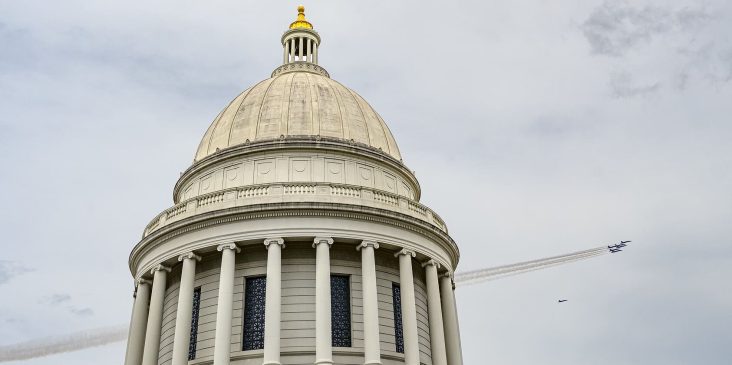Legislators move tax cut bills quickly to floor; reveal incentive package for $3 billion steel project
by December 7, 2021 4:35 pm 1,480 views

Arkansas lawmakers went straight to work on Tuesday (Dec. 7) in their special session to deal with income tax cuts, and State Senators showed little interest in expanding the scope of the session beyond the governor’s call.
Lawmakers quickly passed in committee the main legislation for the special session’s call, a reduction in the individual income tax rate from 5.9% to 5.5% in the current fiscal year and subsequent reductions to pull the top state income tax rate down to 4.9% by 2025.
The House and Senate Revenue and Tax committees moved HB 1001 by Rep. John Maddox, R-Mena, and SB 1 by Sen. Jonathan Dismang, R-Beebe, out of committee for consideration tomorrow (Wednesday) morning in their respective full chambers. The tax impact is expected to be about $133 million in year 1 in lowering the tax to 5.5% and $430 million by year 5 when the tax would be fully reduced to 4.9%.
In the Senate Revenue and Tax committee, a bill by Sen. Trent Garner, R-El Dorado, to eliminate all individual income taxes within 10 years was not considered because it did not have a fiscal impact statement attached to it, which is required by committee rules.
In the State Senate, an effort was made by Sen. Jason Rapert, R-Bigelow, for consideration of two additional tax reduction bills that would give tax credits to law enforcement officers. While Lt. Gov. Tim Griffin, R-Ark., ruled the bills germane to the special session call, senators approved two motions to overturn his ruling and block the bills from consideration.
The resistance to expanding legislation beyond the call of Gov. Asa Hutchinson’s special session proclamation suggests that lawmakers could wrap up their business this week.
Gov. Asa Hutchinson used part of his weekly press briefing Tuesday to lobby for his tax cut plan and push back against those who say the plan primarily benefits the wealthy.
“As you know the focus of this session is passing the largest tax (decrease) in Arkansas history – nearly $500 million dollars of tax relief each year when it is fully implemented. All taxpayers will benefit from this tax reduction plan. Lower income individuals will see a greater percentage reduction in their taxes than any other category group. Over 100,000 low income Arkansans will have their state income tax liability totally eliminated by this plan,” he said.
The governor has also called for a bill during the special session to alter incentives for a recycling tax credit. The change, outlined in SB 10, allows the state to negotiate incentives for a “steel mill facility” economic prospect. The incentive applies to a potential steel project that is being considered for location in three states: Arkansas, Alabama and Mississippi. Arkansas needs the incentive for competitive purposes.
The tax credits for the $3 billion project would allow for $11 million per year in recycling tax credits if two state agency analyses show a positive cost-benefit for the state. The project is expected to create 900 direct jobs at $106,000 per year in Northeast Arkansas, according to testimony provided by Arkansas Secretary of Commerce Mike Preston. Another 200 indirect jobs are expected to be created with potential salaries around $60,000 annually, according to legislative testimony.
Mississippi County is steel country with several steel mills, ancillary businesses and thousands of jobs. U.S. Steel bought the remaining stake in Big River Steel, located in Northeast Arkansas, in December 2020. Nucor Steel also has major steel facilities in Northeast Arkansas. The Joint Budget Committee on Tuesday also authorized $50 million to be spent on additional incentives to lure the $3 billion project to the state.
“We’re in the driver’s seat, we’re in the lead provided we can do a few other things to work this out,” said Sen. Dave Wallace, R-Leachville, the lead sponsor of SB 10. HB 1007, sponsored by Rep. Joe Jett, R-Success, is a companion bill to SB 10. It passed out of House Revenue and Tax Committee on Tuesday.
